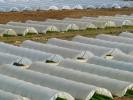H2020 REFRESH Project: Resource-Efficient Food and Beverages for the Entire Supply Chain
- Type Project
- Status Filled
- Execution 2015 -2019
- Assigned Budget 8.999.757,79 €
- Scope Europeo
- Main source of financing Horizon 2020
- Project website Proyecto REFRESH
WP1: Based on the research framework, a large cross-national survey was implemented, preceded by two pilot studies to construct the measurement scales. A qualitative study was conducted on the use of ICT-based tools for food management and waste prevention at the consumer level. The influence of on-pack information on behavioral intentions and utility from the consumer perspective was studied using a viral survey. Finally, the results of the study on consumer acceptance of valorizing by-products for (in)direct human consumption were published.
WP2: In support of the PWPs in NL, HU, ES, and GE, the AF agreements and action-based innovation projects were evaluated. The FA and PWP approach continued to be replicated with Chinese partners. The online Expert Community was launched, which also organized four webinars on REFRESH key outcomes. The development of DSS tools was finalized, including gap analyses, a rapid analysis tool, DSS for food waste monitoring in retail, and a set of scientific articles. The Blueprint approach to the Action Frameworks has been completed, and four preparatory workshops have been held with interested MS.
WP3: The first deliverable on the systems maps and analytical frameworks was finalized and published, identifying drivers of food waste along the supply chain in five food product categories with a high prevalence of food waste. Second, the policy mix assessment was published. The Review of EU policies with relevant impact on food waste prevention and valorization was published. Six policy work platforms were organized, and four policy briefs were published. Recommendations based on the workshop and reports have been summarized. The need for harmonized EU legislation on food (and not just food waste) was underlined.
WP4: An integrated model linking Bayesian and agent-based models was developed to assess consumer food waste. Diffusion of innovation along the chain was studied using IT and NL cases. The developed roadmaps and web-based tool enable simulations based on a hierarchical Bayesian mixed-effects modeling approach. The pan-European scenarios on food waste levels consist of 30 reports on simulations of the amounts of food waste generated at the regional and national levels. Several scenarios were developed into a pan-European simulation of selected interventions.
WP5: A simplified approach to estimating and comparing different valorization options was developed as the basis for the FORKLIFT tool, written as a spreadsheet and fed with data from five lateral streams. Full life cycle assessments (LCAs) were performed for the nectarine and peach supply chains in Italy. Other cases include pig feed, the German meat production chain, and tomatoes. It was demonstrated that, if production could be reduced and resources used more efficiently, the considerable global warming mitigation potential could be achieved.
WP6: FoodWasteExplorer was developed as an open-access online resource on side stream composition and features over 26,000 data points. A breakfast cereal beverage model was formulated using chicory root fiber, as well as consumer acceptance testing. Research was carried out to investigate the use of vegetable side streams treated using steam explosion. A techno-economic analysis was performed. A feed DST was developed for the UK, Ireland, and the Netherlands. Technical guidelines were completed on the potential to process surplus food for use as safe pig feed. The conversion of putrescible waste into fuels and chemicals was investigated. A report was produced on identifying how external conditions may influence the development of food waste conversion options. Valorization approaches were analyzed to determine their potential contribution to achieving EU food waste reduction targets.
WP7: A wide variety of dissemination activities have supported the REFRESH project, including updating the project's dissemination strategy, updating the website, using social media, updating the corporate design of communication products, producing newsletters, and updating the intermediate results booklet. Supporting training on key messages was delivered at the CG and EBM meetings. Click-through statistics were collected. 348 articles were published; the total number of website visits was 282,970, with 511,051 page views. The Center of Excellence (CoE) will be continued after 2019 by the EU Platform on FLW. Approximately 4,000 participants attended REFRESH events. In 2016, the REFRESH "Food Waste Solutions Competition" was organized, receiving more than 50 proposals. The public vote for the best ideas garnered over 61,000 votes. The contest was replicated in China. In 2019, the "Doggie Bag Contest" was organized. Six newsletters were shared during the project with 851 subscribers. The Twitter account had 2,165 followers and 763 tweets were posted. @EURefresh was tagged 1,640 times and reached 135,000 followers. The Facebook account reached 1,001 likes, from 629 posts. Several project videos were produced and posted on YouTube with 5,000 views. Approximately 90 mentions of REFRESH were made in other media. REFRESH was presented at over 170 external events. WP8: This WP manages the project and administrative aspects of REFRESH, and coordinates the consortium and its governance bodies. One board meeting, one review meeting, and one mid-term activity report were held on M37-M42. Nine regular monthly EB meetings were held, as well as three face-to-face EB meetings and bilateral EAB meetings with the Strategic Coordinator.
An estimated 89 million tons of food are wasted in European (EU) countries each year (FUSIONS 2016), and models suggest this figure could rise to over 120 million tons by 2020. Food waste is a major contributor to global carbon emissions, with carbon emissions associated with food production and waste equivalent to those of the third largest carbon-emitting country after the United States and China (FAO 2013). Food waste is ethically unjustifiable in a world where nearly one billion people remain undernourished. Reducing food waste along the food supply chain is a key mechanism for creating a sustainable food system. This brings economic, social, and environmental benefits. The European Commission has prioritized reducing food waste in its Circular Economy Package (December 2015). The overall objective of REFRESH is to prevent and reduce avoidable food waste throughout the supply chain, as well as to optimize resource utilization within the food system and the valorization of waste streams, including packaging.
The overall objective of the REFRESH project is to contribute significantly to the goal of reducing food waste across the EU by 30% by 2025 (equivalent to 25-40 million tonnes of food not going to waste by 2025[1], worth tens of billions of euros annually) and to maximize the value of unavoidable food and packaging waste. To achieve this ambitious goal, we will take a systems approach and use cutting-edge science to enable action by businesses, consumers, and public authorities. A central ambition of the REFRESH project is to develop a "Framework for Action" model based on strategic agreements at all stages of the supply chain (endorsed by governments), implemented through collaborative work, and supported by evidence-based tools to enable targeted and cost-effective interventions. Success will support the transformation towards a more sustainable and secure EU food system, benefiting Europe's economy, environment, and society.
REFRESH's main areas of impact are:
- Reducing food waste by consumers.
- Increased food donations and redistribution (to people in need) by businesses (from producers to retailers).
- Reducing food waste in the retail and food sector through improved supply chain management; Reducing food waste in the restaurant, food service, and hospitality sectors.
- Conversion of food and secondary resource losses into higher-value products (feed, bio-based products, ingredients), and - Reduction of food waste in the (post-harvest) supply chain (primary production, transport, processing, and manufacturing). REFRESH succeeded in establishing initial inventories and analyses in its first two project periods and, through its dissemination efforts, created considerable scope for sharing knowledge and best practices among European and Chinese stakeholder groups. The impact of the project's scope is described in D7.2.
- STICHTING WAGENINGEN RESEARCH (WR)







